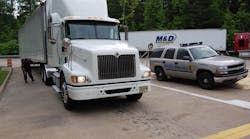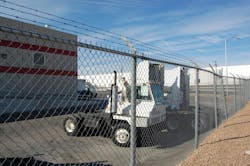Safety and security are issues that should never be too far from the minds of trucking executives – especially when it comes to the increased risk posed by insider threats.
Not so much in terms of terrorism, mind you – for that’s largely still an external threat – but more in terms of criminal activity, especially data theft and hacking.
A new and very worrisome trend I’ve noted in this space before that’s complicating efforts to deal with insider threats revolves around efforts to limit background checks on employees – an effort called in some circles “banning the box.”
Take, for example, the results of a survey conducted among 337 corporate executives by background screening firm First Advantage last year.
That poll found that “most important security controls” for thwarting cybercrime isn’t anti-malware software or beefed up physical security measures but better background checks of current and prospective workers.
“The fact is that an initial background check does not protect an organization in perpetuity,” noted Mark Silver, chief security officer at First Advantage. “In order to better protect against potential insider-driven breaches, periodic re-screening should be done.”
According to the firm’s poll, 60% of respondents said employee background screening is “the most important security control” that can be put in place to protect organizations, followed by anti-malware (53%) then physical security and physical access controls (39%).
To widen the ability of tucking companies to use such “controls,” First Advantage recently partnered with SambaSafety to offer continuous driver monitoring services – crafting what the two firms call a “single solution” that connects pre-hire driver record checks to a post-hire driver risk management program.Mark Carlson, vice president of sales, tax and fleet solutions for First Advantage, noted in a statement that SambaSafety’s cloud-based software-as-a-service (SaaS) solution continuously monitors individual drivers, automatically identifying new violations and alerting management to high-risk driving behavior.
That allows motor carriers to craft in Carlson’s words a “streamlined process” to establish an initial driver risk profile and enroll drivers into the continuous monitoring program; a program that also contributes to the upkeep of driver qualification files (DQFs) required by the Department of Transportation (DOT).
Chris McKay, president of SambaSafety, noted that his firm’s “DriverScore” uses what he calls a “common coding system” for violations that go beyond conventional motor vehicle records (MVRs) to provide a more comprehensive “driver safety assessment.”
That’s well and good from a safety perspective, but from a broader security perspective, expects such as Russ Law, chief operating officer with screening firm Verensics LLC, believes more comprehensive work by motor carriers should be done – screening work not just limited to truck drivers, either.
Verensics pre-screening tool works like a “virtual polygraph” test in many ways, he told me during an interview a few weeks back – starting with an online survey during the pre-employment screening process:
“Our questionnaires are written by professional interrogators: they are looking for things like ‘answer consistency’ and how long it takes someone to answer particular questions – even how they are moving the mouse on their computer screen,” Law said.
“Those inputs correlate to levels of honesty and dishonesty – it’s a very powerful self-reporting mechanism,” he explained. “And we’re staying well within the guidance of EEOC [Equal Employment Opportunity Commission] because we’re building a unique personality profile based by a prospective employee answering questions themselves.”Law added that Verensics questionnaires can be “customized” to fit particular industries – such as trucking – in order to focus tightly on specific risks, be they in terms of driving behaviors or data security.
“Our questionnaires also provide insight into: how long a potential hire might stick around and how ‘loyal’ they might be; how they feel about alcohol and drug abuse; and how trustworthy they might be around the transportation of valuable goods,” he noted.
“It all comes back to evaluating risk,” Law stressed. “Traditional background checks maybe touch on 5% of those things – and most companies don’t want to report stuff that becomes part of a background check anyways.”
Such checks can miss things, as well, he pointed out. For example, most background checks extend back seven years – but if a potential applicant served time in prison a decade before, that information won’t show up.
“That’s why our system is designed to look at a candidate’s ‘mindset,’ evaluating them on the front end and then on a yearly basis as part of annual compliance/ethics checkup,” he said. “That’s because people’s life situations change over time.”
Law specifically referenced the terrorist Omar Mateen who attacked an Orlando nightclub back in June as an example of “life situation” change, for he’d passed two background checks prior to his being hired as a private security guard.
“We’re trying to fill the gap between what’s occurred in the past and the mindset of applicant in present, in the here and now,” Law said.
That’s an issue every business – trucking or not – is struggling with nowadays. And it’s a struggle where, unfortunately, the stakes are getting stacked very high indeed.





